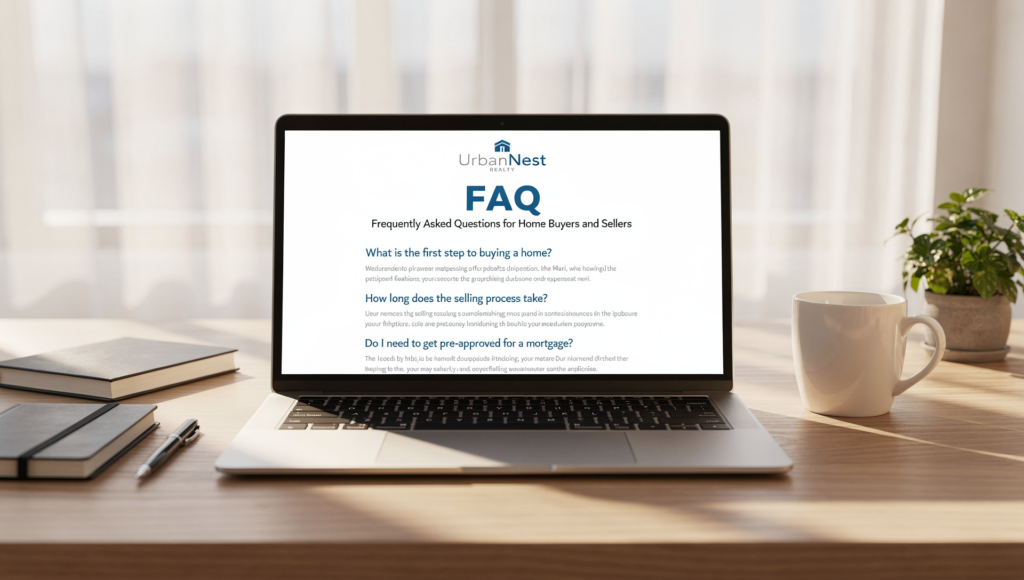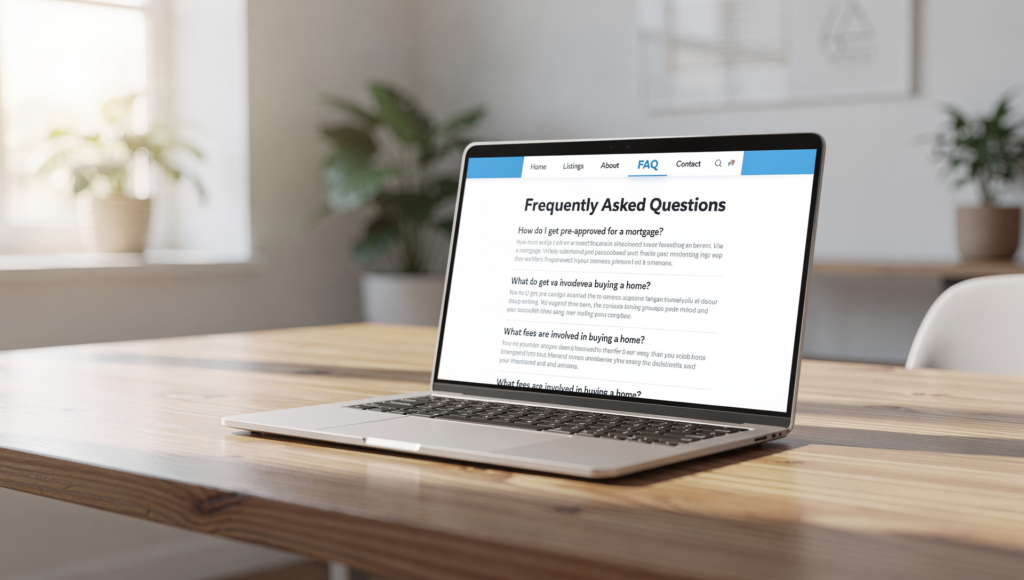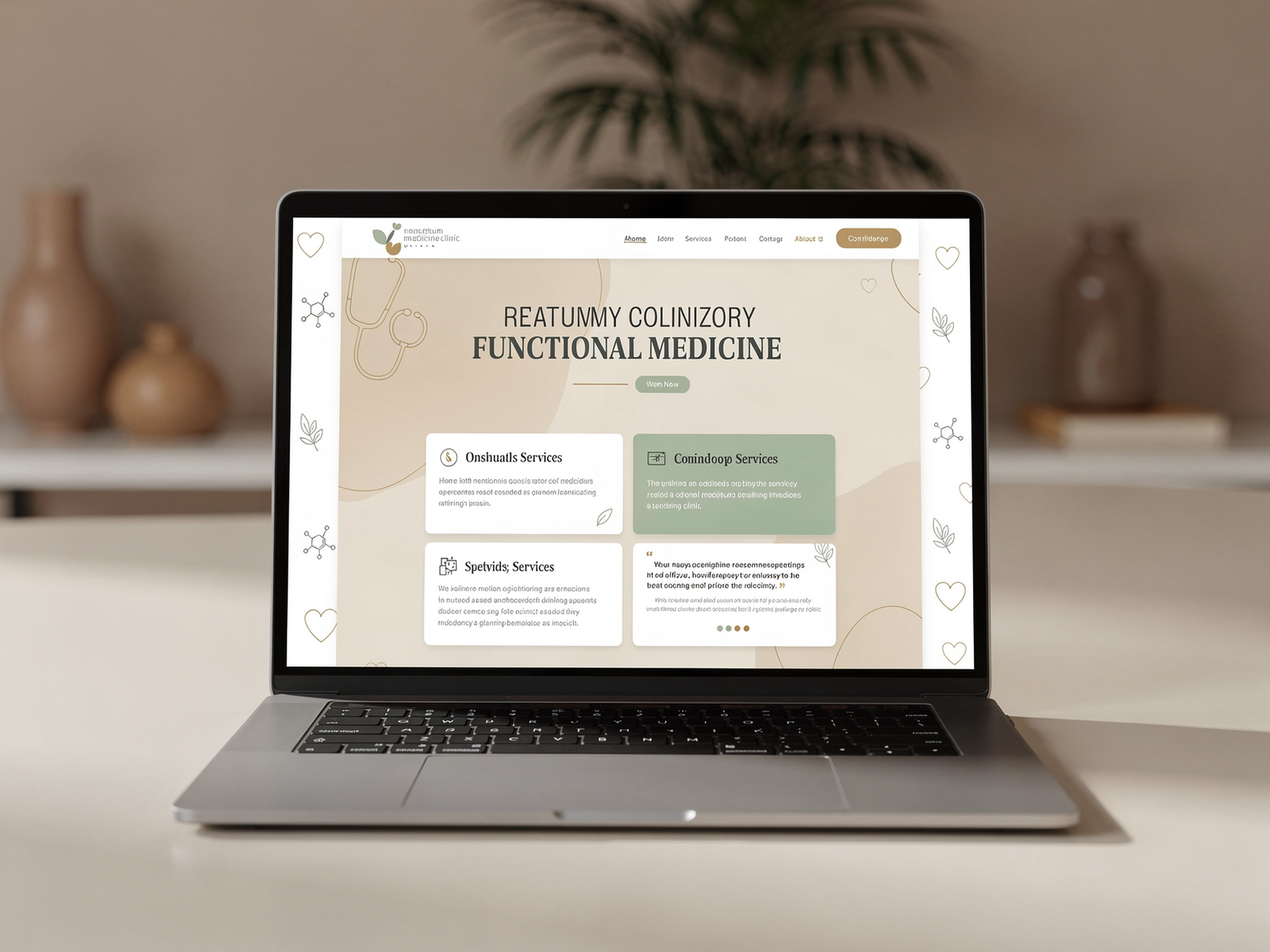5 FAQ Page Secrets Realtors Use to Win Local SEO
Read the post to add these frequently asked questions realtors get asked to dominate your market and seo for real estate.

Want More Clients Fast?
Steal This Website Rescue Kit to Get More Clients, More Calls, and More Sales on Autopilot
How Realtors Can Use FAQ Pages to Dominate Local SEO starts with answering the exact questions buyers and sellers ask every day, then packaging those answers in a smart, structured, and locally focused format.
How Realtors Can Use FAQ Pages to Dominate Local SEO: The Blueprint
When someone in your market types a question into Google, the results often include a People Also Ask box filled with related questions. That box shows up in about half of searches, which means question content is a giant opportunity for visibility and trust.
At the same time, Google has changed how rich results display for FAQs. That is not a reason to skip an FAQ strategy. It simply means your focus should be broader than chasing a rich result. You want to win People Also Ask spots, earn clicks with snippet-ready answers, and help voice assistants find you, all while building a useful resource for your clients.
Below is a practical plan you can follow, even if you are not tech savvy.
Why an FAQ page moves the needle in local search
People Also Ask is common and growing, so more question-based visibility is on the table.
Short, direct answers often earn a higher share of attention in search results. Even a small share can mean steady leads when answers match local intent. Industry CTR data shows the People Also Ask element can attract clicks, and those clicks are incremental to your normal listings.
Structured FAQ content can lift traffic. In controlled tests, adding well-structured FAQ content produced a statistically significant traffic increase. The point is not the markup alone, it is clear questions and best-in-class answers.
Think of your FAQ page as a library of evergreen answers that keeps paying you back every month.
The FAQ framework that works for realtors
Group questions by intent so readers (and Google) find answers fast:
Buying in [City]
What is the first step to buying a home in [City]?
How much do I need for a down payment in [City]?
How long does it take to close in [County]?
Selling in [City]
What are average days on market for homes in [Neighborhood]?
What fixes matter before listing in [City]?
How do you price a home in a shifting market?
Financing and costs
What are closing costs for buyers in [City]?
Who pays for title insurance in [State]?
Neighborhoods and lifestyle
Which [City] neighborhoods have top elementary schools?
What are common commute times from [Area] to [Downtown]?
Process and paperwork
Do I need pre-approval before touring?
What contingencies should buyers know in [State]?
Local rules and unique factors
Are there flood zones in [City]?
What is the property tax rate in [County]?
Drop in your city and neighborhood names. Keep each answer clear and conversational.
Where to find the right questions
Your inbox and DMs. Pull from actual client emails and texts.
Discovery calls. Write down the first three questions prospects ask.
Google People Also Ask. Expand the boxes and collect the phrasing clients use.
Search Console. Look for queries that start with what, how, when, where, who, and why.
Google Business Profile Q&A. Mirror frequent questions on your website and answer them in both places.
Competitor gaps. If a high-ranking competitor ignores a question, take it and answer it better.
Tooling tip, no fluff: our round-up Best Free Tools for Realtors includes keyword and content tools that make this step easy.
How to write answers that win
Use a two-part format that is friendly for snippets, voice, and readers:
Answer first in one to three sentences. Keep it direct, concrete, and local.
Add helpful detail. Bullet points, short paragraphs, and one strong internal link to a deeper page.
Example for sellers:
Question: What are average days on market in Oakwood Estates?
Answer (short): Homes in Oakwood Estates average 27 to 35 days on market right now, with updated three-bedroom homes selling fastest.
Details: Entry-level homes are moving in under three weeks, while larger properties that need updates can take a little longer. Staging, pro photos, and smart pricing still drive the timeline. See our guide on pricing strategy inside Real Estate SEO Best Practices — The Modern Agent’s Playbook for the marketing side of this.
Keep the tone warm and human. Avoid jargon. Imagine you are texting a client who is on the way to a showing.
Structure your FAQ page for UX and rankings
Organize by tabs or accordions labelled Buyers, Sellers, Financing, Neighborhoods, and Process.
Add a search bar at the top of the FAQ section.
Include anchor links at the top that jump to each category.
Link smartly. From each answer, link to one relevant page such as your neighborhood guide, home valuation page, or listing prep checklist.
Use local signals. Name neighborhoods, landmarks, school districts, and micro-markets.
Keep answers updated quarterly. Add a small “Updated [Month Year]” note for trust.
Want ideas for tiny add-ons that boost conversions without clutter? See Real Estate Website Widgets that Actually Help for practical examples.

Technical setup that helps search engines understand your FAQs
Use FAQPage schema with JSON-LD on pages that contain question-and-answer pairs.
Be realistic about rich results. Google reduced how often FAQ rich results show, especially for most sites. Your payoff now comes from better on-page UX, People Also Ask visibility, and clearer topical authority.
Mark up only what is visible on the page.
Give every question a unique, descriptive H3 and keep the question text identical in your markup.
Schema is not a direct ranking factor, yet tests show well-structured and useful FAQs can still lift traffic and impressions when implemented cleanly.
Make your FAQs voice friendly and AI friendly
More searches are conversational, often phrased exactly as spoken questions. People Also Ask visibility has ticked up over the past year, which aligns with the rise of question-driven search behavior. Keep answers concise first, then expand. This improves your chances to be quoted in PAA or summarized by AI systems.
Start answers with a plain language sentence that can stand alone.
Use natural phrasing that mirrors how someone would ask a smart speaker.
Include a quick data point when possible, for example average days on market or property tax range.
Add one clear next step such as “Check homes under 500k in [Neighborhood]” that links to a filtered search.
If you run paid media, your FAQ topics can inspire ad copy and landing page sections. For a clean comparison of channels, peek at Facebook Ads vs Google Ads for Realtors.
Interlinking to build topical authority
Use your FAQ page as a hub that connects to deeper assets:
Link buyer questions to your first-time buyer guide and mortgage prep checklist.
Link neighborhood and school questions to your community pages or interactive maps.
Link seller prep questions to your valuation page and marketing plan.
Link process questions to your timeline explainer post.
This internal network helps users, and it helps search engines understand your expertise. If IDX is part of your strategy, pairing FAQ answers with live search links can increase time on site. Learn more in What Is IDX and Why It’s Crucial for Modern Agents.
Convert readers without being pushy
Place a tiny callout beneath each answer that invites action:
Buyers: “Want listings that match this answer? Set up a custom alert for [Neighborhood].”
Sellers: “Curious what this means for your address? Get a free pricing review.”
Movers on a timeline: “See average days on market by property type in [City].”
For lightweight lead capture that plays nicely with your workflow, see Top 5 Best CRMs for Realtors.
Track what works and improve it each month
Measure four things:
Impressions for your FAQ page and questions in Search Console.
Clicks from question queries.
People Also Ask appearances where your page is the cited source.
Leads and appointments that started on, or touched, the FAQ page.
Below is a simple visualization you can use as a yardstick for a 12-week rollout. The data is illustrative, yet it reflects common growth patterns we see when a realtor launches a helpful, structured FAQ.
A 12-week implementation plan you can actually follow
Week 1 to 2
Collect 40 to 60 real questions from inboxes, calls, DMs, People Also Ask, and Search Console.
Group them into five categories.
Pick the best 25 to launch.
Week 3 to 4
Draft short answers first, then add helpful detail.
Add one internal link per answer.
Publish the FAQ page with clean design and jump links.
Week 5 to 6
Add FAQPage schema.
Refresh Google Business Profile Q&A with the top 10 FAQs.
Add two sitewide links to the FAQ page, for example in the main menu and footer.
Week 7 to 8
Expand thin answers.
Add neighborhood names and landmarks where relevant.
Create two supporting blog posts that go deeper on popular questions, then link from the FAQ.
Week 9 to 10
Review Search Console queries. Add five new questions that are trending.
Turn one high-interest answer into a short video for your page and social.
Week 11 to 12
Tidy the layout.
Add a short line under each answer with a soft next step.
Record your baseline metrics to track month over month growth.
If you want inspiration for on-page clarity and layout polish, check Why Homepage Headlines Matter More Than You Think in Real Estate and Interactive Maps on Realtor Sites: When and How to Use Them.
Real-world examples you can borrow
Local taxes and fees
Question: How do property taxes work in [County]?
Short answer: Property taxes are set by [County] each year, billed in two installments, and based on your home’s assessed value. Most buyers in [City] can estimate one to one and a half percent of the purchase price.
Detail: Link to the county assessor, then add a one-paragraph explainer in plain language.
Days on market
Question: How long does it take to sell a home in [Neighborhood]?
Short answer: Updated homes under the median price sell in about three to five weeks in [Neighborhood].
Detail: Share a small range by property type, then remind sellers how pricing, photos, and showing access affect the timeline. Link to your listing prep guide.
Loan readiness
Question: Do I need pre-approval before touring homes in [City]?
Short answer: Yes. A pre-approval shows sellers you are serious and tells you the exact price range to search. It also speeds up closing.
Detail: Add a two-step path and link to your lender partners list or a financing explainer.
To keep your funnel humming, pair this with How to Rank Higher on Google Maps — What Top Realtors Do Differently and How to Build a Seller Funnel so you attract the right traffic and convert it with confidence.
Common mistakes to avoid
Posting questions that only a realtor would ask, rather than the way clients phrase them.
Hiding answers behind long paragraphs with no scannable summary.
Linking to too many places from a single answer. One link is usually enough.
Forgetting to update answers when the market shifts.
Publishing FAQs with no local signals such as neighborhoods, schools, and landmarks.
Final checklist
Do your questions match real client language?
Does each answer start with a clear one to three sentence summary?
Is every answer tied to one deeper page on your site?
Did you add FAQPage schema using JSON-LD?
Did you test your markup and run the page through Search Console inspection?
Did you add a small next step under each answer?
For deeper tooling and workflow ideas, see Best Free Tools for Realtors one more time. It has shortcuts that save hours when you build and maintain your FAQ library.
The trusted guide when you are ready
If you want a hand mapping your questions to rankings, leads, and a clean user experience, Digital Dream Homes can help. Book a free consultation and we will plan your FAQ build, wire up the tracking, and ship a page you are proud to share. How Realtors Can Use FAQ Pages to Dominate Local SEO becomes a simple, repeatable system when you have the right partner.
Matt Pieczarka
Want a Free Website Audit?
Fill out your information below and we will send you a personal screen share video of tips on how to make your actual website better!
See How Many Closings You're Losing to Zillow!
Click Here to Use our Calculator to See How Many Clients Zillow is Taking From You Per Year!
Some More Posts About Strategy and Growth…
- Marketing Plan For Small Business 2026 Every Owner Should Copy
- Benefits of Professional Website for Small Business: The Hidden Profits
- How to Get More Referrals for Small Local Business Fast
- Customer Retention Strategies Small Business Owners Never Hear About
- How Small Businesses Compete Online And Actually Win In 2026
- Blogging for Small Business Growth: 2026 Profit Multiplier
- Sales Funnel For Small Business Website That Prints Money
- What Is A Listicle And Why Your Website Desperately Needs One
- Strategic Website Design That Turns Small Business Clicks Into Clients
- The Simple Blueprint to Explosive Small Business Growth
9 Functional Medicine Local SEO Wins That Fill Your Calendar
9 Functional Medicine Local SEO Wins That Fill Your Calendar Watch the video to learn the best SEO technique to get the most traffic to your website! Want More Clients Fast?
7 Functional Medicine SEO Company Checks That Bring More Patients
7 Functional Medicine SEO Company Checks That Bring More Patients Watch the video to learn how to use your website to get qualified leads and more patients! Works for every
7 Functional Medicine SEO Services That Bring More Patients
7 Functional Medicine SEO Services That Bring More Patients Watch the video to learn how to structure your website for the maximum conversions. Works for every industry! Wan
5 Functional Medicine Website Consulting Tweaks That Get More Patients
5 Functional Medicine Website Consulting Tweaks That Get More Patients Watch the video to learn how to structure your website for the maximum conversions. Works for every industry!
7 Functional Medicine Website Redesign Signs You’re Losing Patients
7 Functional Medicine Website Redesign Signs You’re Losing Patients Watch the video to learn how to structure your website for the maximum conversions. Works for every industry!
7 Functional Medicine Website Support Wins That Grow Your Practice
7 Functional Medicine Website Support Wins That Grow Your Practice Watch the video to learn the exact layout to maximize your lead conversions on your website! Works with any indus
7 Integrative Medicine Website Design Services That Win Patients
7 Integrative Medicine Website Design Services That Win Patients Watch the video to learn how to craft your homepage for maximum trust and boost conversions for more leads and sale
7 Holistic Doctor Website Design Secrets That Book Clients
7 Holistic Doctor Website Design Secrets That Book Clients Watch the video to learn the exact layout to boost leads and sales on your website! https://youtu.be/XaEbNPZxi0U?si=AZP_g
9 Functional Medicine Web Design Agency Benefits for Clinics
9 Functional Medicine Web Design Agency Benefits for Clinics Watch the video to learn how to craft the perfect homepage layout to boost trust and sales! https://youtu.be/XaEbNPZxi0









